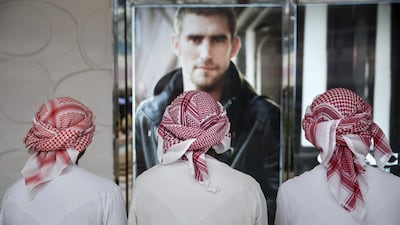One doesn’t need to look too far to find discussions about the “threat to Emirati identity”, “the deterioration of the Emirati culture” and “the loss of the Arabic language”. These issues are discussed on social media and in print, at public and private events, and during informal conversations. There is ever-increasing concern among UAE nationals about the decline of “Emirati identity”.
These concerns are based on legitimate foundations, particularly because Emiratis are a minority in our own country.
A survey by the market-research company YouGov found that 60 per cent of Emiratis questioned said "they felt a sense of isolation as their cultural identity became increasingly diluted by large numbers of expatriates".
The use of the Arabic language is also decreasing, particularly among young people, due to globalisation and other social factors, including the common reliance on foreign maids and nannies to take care of young children.
There are an increasing number of Emiratis studying foreign education curricula in the UAE's private schools. Some parents are concerned about the level of attention paid to religion and Arabic language in these schools.
Media and popular culture are also a source of concern for many parents because they expose youth to music, movies and television programmes with western ideas and culture. Some young people are not as committed to wearing national dress as the previous generations.
While we all agree that these are serious issues that need to be addressed, they cannot be tackled by turning inward against outside influences, which is what the popular discourse suggests. Instead, we should be open and acknowledge the shortfalls of both society and the education system that has failed to reach a balance between what we value and the global culture that cannot be resisted.
The popular discourse seems to assume that identity is given and this neglects its complex nature.
National identity is not given as represented in the public discussions but rather “a social construction that is formed and shaped by multiple factors, such as state discourse, the creation of nation’s history and mythology, individual socialisation and subjective interpretations”, as Dr Kristian Alexander, an assistant professor at the college of humanities and social studies at Zayed University, wrote.
Social science tells us that identity is constantly evolving and it’s constructed by complex forces. What the Emirati identity is going through is a natural process that occurs in all societies around the world.
What makes the UAE different is that it’s a very young country that was only born 42 years ago, and second it was born in a globalised world and had to bring in a massive number of expatriates to build its economy.
The popular discourse regarding Emirati identity and some of the policy responses that followed also seem to imply that by acquiring a new global culture, Emiratis have to give up their original culture but several scientific studies suggest this is not true.
Groundbreaking research on social cognition and cross-cultural psychology suggests a different view on culture by demonstrating that individuals have the ability to incorporate multiple cultures without having to replace existing cultural knowledge. However, these cultural meaning systems don't guide their cognition simultaneously.
This defies the assumption that Emirati culture is under the threat of extinction, especially with the continuous efforts to preserve it.
A demonstration of this would be how many members of the young generations of Emiratis speak both Arabic and English and have both traditional and global outlooks.
Many young women, for example, wear the abaya with international clothes underneath. The solution, therefore, lies in helping the new generations of Emiratis to reach this balance as well.
Therefore, the public discourse should be shifted from focusing on “threat on the Emirati identity” and the “loss of the Arabic language” to promoting bilingualism in the UAE and embracing the positive impacts of multiculturalism on the society and the value of individuals having integrated identities in today’s interconnected world.
Young people should be made aware of the fact they don’t need to choose either their culture or another, but they can incorporate them all.
And more importantly, we need to look into the roots of the problem. The education system should be strengthened, particularly in areas like history and the Arabic language.
There are examples of successful bilingual education systems in the world, such as in Singapore, from which the UAE can learn.
Families need to be open-minded and take part in helping their children find a sense of balance between their culture and the global culture.
Both home and schools have a critical role in defining and bolstering local values and teaching children how to be citizens of the world and at the same time hold onto their roots.
aalmazrouei@thenational.ae
On Twitter: @AyeshaAlmazroui

